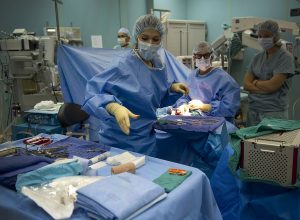A nurse practitioner is a registered nurse with advanced education and training in clinical practice.
With this advanced education and training, they are able to perform comprehensive health assessments, manage and treat illnesses, and make diagnoses. They are also able to order and perform tests and procedures, as well as prescribe medications.
There are many reasons you may be wondering what the salary is for a nurse practitioner. You might be a nursing student just getting started in your nursing journey, a registered nurse curious about becoming a nurse practitioner, or a nurse practitioner already.
Salaries for nurse practitioners vary based on several factors. One of the key factors is location. In this article, we will look at the salaries of nurse practitioners in Vancouver.
In addition, we will examine how much schooling is required, how to become a nurse practitioner in Vancouver, and what nurse practitioners in Vancouver can do as far as their duties and responsibilities are concerned.
How Much Do Nurse Practitioners Make in Vancouver?
Depending on their specialization and years of experience, nurse practitioners in Vancouver make varying salaries. Below is a breakdown of average hourly and annual nurse practitioner salaries in Vancouver, as well as entry-level and experienced salaries.
What is the Average Amount Nurse Practitioners Make in Vancouver?
Salary levels for nurse practitioners can differ greatly by specialization, experience, and location. In Vancouver, nurse practitioners earn an average of:
- $62.43 per hour
- $129,864 per year
How Much Do Entry-Level Nurse Practitioners Make in Vancouver?
Nurse practitioners just starting out will make less than their more experienced counterparts. The salary amount for new nurse practitioners also differs depending on their specialization. Entry-level statistics here are for nurse practitioners with 1-3 years of experience. The average pay for entry-level nurse practitioners in Vancouver is:
- $43.57 per hour
- $90,629 per year
How Much Do Experienced-Level Nurse Practitioners Make in Vancouver?
The longer a nurse practitioner has been in practice, the more money they will make. Over time, nurse practitioners’ pay will increase as they advance in their careers. The statistics here apply to those who have more than 8 years of experience as a nurse practitioner.
As with the average and entry-level statistics, the experienced-level salaries also vary depending on the nurse practitioners’ specialization. Accordingly, the following is the average pay for experienced nurse practitioners in Vancouver:
- $77.62 per hour
- $161,442 per year
What is the Salary Potential for Nurse Practitioners in Vancouver?
The estimated average salary for nurse practitioners in Vancouver in 2027 is $151,280. That’s a 16% increase over the course of 5 years. For nurse practitioners who are considering a career in Vancouver, this shows great salary potential and growth.
How Does Vancouver Compare with the Rest of Canada for Nurse Practitioner Salary?
Overall, the average salary for nurse practitioners in Canada is $120,626 per year. With the average salary for nurse practitioners in Vancouver being $129,864, or an equivalent hourly rate of $62, the average Vancouver salary is $9,238 or 8% higher than in Canada as a whole.
A number of factors determine salaries by province, including cost of living. Additionally, salaries vary from city to city within each province.
Vancouver’s cost of living is 43% higher than the average cost of living in Canada. The cost of living is calculated based on accumulating the cost of rent, food, transportation, health services, utilities, taxes, and various other factors.
Also Check- How Much Do Entry-Level Nurse Practitioners Make in Ottawa?
Is There a Demand for Nurse Practitioners in Vancouver?
Vancouver has a great need for nurse practitioners. With the retirement of nurse practitioners, there is a need to fill those positions. Also, as the lifespan increases and healthcare advances, people are in more need of healthcare as they age.
There are currently about 426 nurse practitioners in British Columbia. The government is planning on creating 200 new nurse practitioner positions. As a result of the new positions, there will be a total of 626 nurse practitioners in communities across the province, including Vancouver. These positions will assist patients as the healthcare system moves to a more team-oriented approach.
How To Become a Nurse Practitioner in Vancouver?
As a nurse practitioner, you must be a registered nurse and have completed a master’s program.
Getting accepted into a master’s in nursing program is the initial step. Before admittance to a master’s program, an applicant will need to have experience working as a registered nurse for a certain number of years (usually two or three) in their desired specialty.
How to get into a Master’s in Nursing Program
- Degree: Applicants need a Bachelor of Science in Nursing degree or have completed an RN to BSN bridge program.
- Nursing License: Applicants must provide a copy of their current nursing license.
- Prerequisites: Depending on the program, certain prerequisite courses may be required before admittance.
- Performance: Testing performance may be required, depending on the program.
What Can Nurse Practitioners Do in Vancouver?
In Vancouver, there are five recognized specialties for nurse practitioners:
– Primary Care
- Treat patients ranging from infants to adults
- Wide range of family-focused care from health promotion to chronic illnesses
- Acute care centers, physician offices, hospitals, long-term care facilities, hospice centers, private care with patient’s home, urgent cares, correctional facilities, private practice
– Neonatology
- Treat high risk-infants, usually in a neonatal intensive care unit within a hospital
- Provide support and education to families for the infants they’re treating and work closely with the neonatologist
- Hospitals, clinics, home health care services, patient transport, research
– Pediatrics
- Treat children of all ages, from birth up to the age of 21
- Health promotion, along with diagnosis and treatment while working in collaboration with a pediatrician
- Hospitals, urgent cares, specialty clinics, physician offices, schools, private clinics
– Adult Care
- Treat patients from early adulthood to older adults
- Primary care or acute care
- Hospitals, long-term care facilities, nursing homes, hospice facilities, private practices, specialty clinics
– Mental Health
- Treat and care for those with mental illness, and their families
- Practice in offices, outpatient centers, residential facilities, and inpatient hospitals
Nurse practitioners can perform many of the duties that are typically reserved for doctors. Nurse practitioners are capable of performing procedures and maintaining responsibilities in addition to those of a registered nurse since they have advanced degrees and training. These responsibilities and duties include:
- Diagnosing conditions, illnesses, and diseases
- Prescribing medications
- Applying medical treatments or using techniques that are invasive
- Prescribing diagnostic examinations
- Providing pregnancy care
- Identify, prescribe, and monitor medical treatment
- Using invasive diagnostic techniques
- Education and leadership
- Consultations
- Research
How Long Does it Take to Become a Nurse Practitioner in Vancouver?
The amount of time it takes to become a nurse practitioner in Vancouver varies. The time it takes to become a nurse practitioner depends on the program and whether you study full-time or part-time. This includes all coursework, as well as any internships and clinicals required by the program.
Nurse practitioners must first obtain a bachelor’s degree in nursing (BSN) and pass the National Council Licensure Examination (NCLEX) to obtain their registered nurse licensure. After completion of their undergraduate degree, they must then receive a graduate degree in nursing—MSN or DNP—which will prepare them to sit for the nurse practitioner licensing exams in the specialty in which they have chosen to practice.
The time it takes to become a nurse practitioner can also vary depending on the degree program—traditional or accelerated. Another factor is how one obtained their registered nurse license.
The entire education process will usually take six to seven years. This includes approximately four years of undergraduate study to obtain a Bachelor of Science in Nursing (BSN) degree, and then about two years to obtain a Master of Science in Nursing (MSN) degree. This process can go faster by going through an accelerated program. It can be slowed down by studying part-time rather than full-time.
Where Can Nurse Practitioners Work?
Nurse practitioners can choose from many different settings to practice in, depending on their specialization. Certain specialities will have more variety, as far as working in both hospitals and clinics. Other specialities will predominantly function in hospitals.
– Primary and Adult Care
- Hospitals
- Clinics
– Neonatology
- Neonatal Intensive Care Unit in hospitals
– Pediatrics
- Hospitals
- Clinics
– Mental Health
- Community
- Hospitals
- Clinics
Conclusion
As we can see, Vancouver has a high demand for nurse practitioners. Throughout the next five years, the government plans on increasing the number of nurse practitioners. As compared to Canada as a whole, the salary for nurse practitioners in Vancouver is higher and more competitive compared to other cities.
Some registered nurses find themselves getting bored after a few years of working at the bedside. They find themselves looking for new opportunities and experiences. If you’re finding yourself to be in this position, look into the nurse practitioner programs in Vancouver and see if there is one that might be a good fit. More autonomy and better pay are appealing benefits.
Nurse practitioners can work more autonomously than registered nurses, so keeping that in mind, along with the increase in pay, it’s a career choice that appeals to many.
Written by Joanne Potter
Joanne Potter, BSN, RN, is a writer that specializes in health and wellness. She has fifteen years of experience as a Registered Nurse in the NICU (Neonatal Intensive Care Unit). Her years working at the bedside and extensive neonatal knowledge enable her to write with a deep understanding of what patients and families want from their communities.
Sources:
SalaryExpert. February 2022
BC Gov News
Recommended articles:












